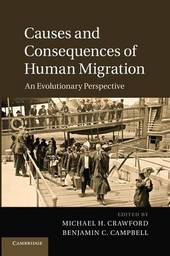
|
Causes and Consequences of Human Migration: An Evolutionary Perspective
Paperback / softback
Main Details
| Title |
Causes and Consequences of Human Migration: An Evolutionary Perspective
|
| Authors and Contributors |
Edited by Michael H. Crawford
|
|
Edited by Benjamin C. Campbell
|
| Physical Properties |
| Format:Paperback / softback | | Pages:568 | | Dimensions(mm): Height 229,Width 152 |
|
| ISBN/Barcode |
9781107644649
|
| Classifications | Dewey:304.8 |
|---|
| Audience | | Professional & Vocational | |
|---|
| Illustrations |
33 Tables, black and white; 2 Halftones, unspecified; 69 Line drawings, unspecified
|
|
Publishing Details |
| Publisher |
Cambridge University Press
|
| Imprint |
Cambridge University Press
|
| Publication Date |
10 July 2014 |
| Publication Country |
United Kingdom
|
Description
Migration is a widespread human activity dating back to the origin of our species. Advances in genetic sequencing have greatly increased our ability to track prehistoric and historic population movements and allowed migration to be described both as a biological and socioeconomic process. Presenting the latest research, Causes and Consequences of Human Migration provides an evolutionary perspective on human migration past and present. Crawford and Campbell have brought together leading thinkers who provide examples from different world regions, using historical, demographic and genetic methodologies, and integrating archaeological, genetic and historical evidence to reconstruct large-scale population movements in each region. Other chapters discuss established questions such as the Basque origins and the Caribbean slave trade. More recent evidence on migration in ancient and present day Mexico is also presented. Pitched at a graduate audience, this book will appeal to anyone with an interest in human population movements.
Author Biography
Michael H. Crawford is Professor of Anthropology and Genetics and Director of the Laboratory of Biological Anthropology, University of Kansas. Benjamin Campbell is Associate Professor of Anthropology, University of Wisconsin, Milwaukee.
Reviews'No single volume can encompass every aspect of human long-distance migration, but this volume does a good job of providing a set of examples that look at the common questions of causes and consequences from diverse viewpoints. One of the major strengths of this book is the organization of most chapters by geographic region, making many chapters good resources for review. Another nice touch is the book's preface which includes interesting anecdotes about the migrant experience of a number of the authors of the chapters.' John H. Relethford, American Journal of Human Biology '... the editors have done a sterling job ...' Journal of Anthropological Research
|